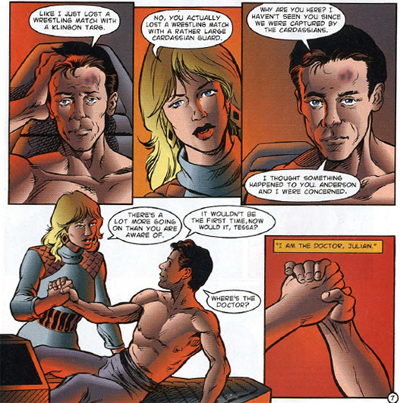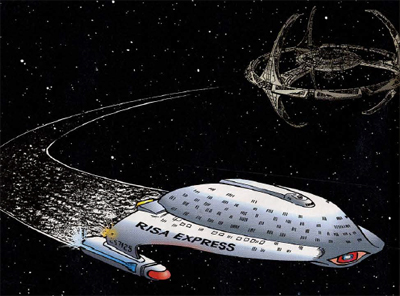Star Trek: Deep Space Nine is twenty years old this year. To celebrate, I’m taking a look at the first and second seasons. Check back daily for the latest review or retrospective.
We’ll be supplementing our coverage of the episodes with some additional materials – mainly novels and comics and films. This is one such entry.
The Maquis: Soldier of Peace is a rather interesting little miniseries, produced while Malibu comics held the rights to Star Trek: Deep Space Nine spin-off comics in the early nineties. Malibu owned the rights to the earliest comics, publishing just over thirty issues of the main Deep Space Nine title between August 1993 and December 1995. Due to Paramount’s desire to exploit the license as much as possible, Malibu only had access to the Deep Space Nine rights, and not to Star Trek: The Next Generation or the original Star Trek.
Malibu would eventually be bought by Marvel, allowing the company to briefly publish Star Trek comics related to all on-going series. However, the company managed to generate an impressive amount of content in the time that it held the rights. Cynics would suggest that company was trying to cash in on the comics boom of the nineties, trying all manner of gimmicks, including one-shots and even a “celebrity” prestige series featuring stories written by Mark Lenard or Aron Eisenberg.
As such, these comics offer an interesting snapshot of where Deep Space Nine was at this point in its history.
Maquis: Soldier of Peace is a very weird miniseries, running three issues – two of which devote space to diverting (if somewhat flat) back-up features. For some strange weird reason, Soldier of Peace starts out as a Bashir story, only to effectively concede that the version of Bashir seen in the first three seasons of Deep Space Nine isn’t really that interesting. Ultimately, after a lot of set up and convoluted plotting, it turns out that the whole exercise is a cynical plot by Gul Dukat to revenge himself upon Garak in the most convoluted manner possible.
The miniseries ran from February through to April in 1995, which leads to some strange timing issues. Obviously, the comic was written and illustrated well ahead of publication, but there’s something surreal about the fact that the last issue was released the same month that Improbable Cause was released – another far stronger story about Cardassians plotting to kill Garak using somewhat convoluted means. (It also adds some wonderful irony to Garak’s assertion that Dukat would never target him on the station – obviously Tain would.)
The biggest problem with Soldier of Peace is that it lacks nuance. In a way, Mark A. Altman manages to be both behind and ahead of the curve. Maquis: Soldier of Peace treats Dukat as the big villain of the piece, a character willing to kidnap a Federation citizen and risk galactic war in order to get petty revenge on Garak.
Written before the fourth season aired, Altman deserves some credit for playing up the conflict between Garak and Dukat, although basing it on events shown in the series – Cardassians and Profit and Loss specifically – rather than pre-existing dirty laundry. That said, the suggestion that there was no previous bad blood between Garak and Dukat does make his decision to screw over Dukat in Cardassians seem a bit less ambiguous. It seems to suggest that Garak’s actions there could have been completely motivated by conscience.
It’s that lack of ambiguity which is so striking about Soldier of Peace. Garak is unambiguously heroic. Not only does he share with Sisko the full and frank details of his relationship with Dulcet – as opposed to the implied shared history with various other Cardassian guest stars – he also makes a self-sacrifice play at the climax, when Dulcet captures our heroes. “It’s obviously me that you want, Dulcet. Why not let the Doctor and go?”
Similarly, Dukat is back to the cookie-cutter pantomime villain from Cardassians, scheming behind-the-scenes for his own political advantage. Altman seems to push aside the more nuanced portrayals of Dukat towards the end of the second season (in The Maquis) and early in the third (in Defiant), in order to turn Dukat into a cartoon villain with convoluted revenge plots.
Garak calls attention to this while conversing with Sisko. “All I am saying, Commander, is that you have grown too comfortable with Dukat,” he warns. “What he has done for you in the past has been because it suited his agenda. Do not mistake that for kindness… or generosity.” To be fair to Altman, this approach to the character is almost prescient. Fearing that the middle seasons of the show had made Dukat too complex or sympathetic, the sixth and seventh seasons would see Deep Space Nine reverting him to a scheming supervillain.
Altman’s portrayal is certainly in keeping with that version of Dukat, even if it seems at odds with the more nuanced portrayal the show was attempting when Soldier of Peace was first published. Although it is worth reflecting that Altman gives Dukat a plan that seems almost absurdly convoluted, even for the man who conspired to hide the son of a political rival away just in case the leverage might come in handy several years down the line. He blackmails the Maquis into kidnapping Bashir so Garak will come to the rescue so he can kill Garak.
Of course, all this underscores another of the major problems with Soldier of Peace. The story initially seems like it’s going to be a Bashir story. This is nice, as Bashir is the character at this point in the show who could most benefit from development. However, Altman’s version of Bashir is almost painfully loyal to the version seen on screen during the first through third seasons of the show: the awkward, arrogant, foolish spoof of Roddenberry’s idealised human.
He’s a womaniser still obsessed with Dax. Garak suggests that Dax’s relationships have become fodder for their afternoon chats, making Julian seem a little jealous. On the cruise to Risa, the first thing he does is to sleazily hit on the most attractive woman he can find. “Don’t bother, she’s been onboard for two days and she hasn’t let anyone buy her a drink,” the bartender warns. “That’s because she hasn’t met me yet, my good man,” Bashir asserts.
Altman doesn’t seem to like Bashir very much, and Soldier of Peace seems designed to emphasise just how unlikeable Bashir is. There’s none of the empathy he demonstrated in The Wire, the strongest Bashir show of the first three years. Indeed, the script treats Bashir’s disappearance as something of a punchline. While Bashir boasts that the crew will be coming to his rescue, we cut to a (somewhat gratuitous) double-page spread of Deep Space Nine, with Chief O’Brien remarking, “Absolutely, Commander. The longer he’s away, the better… you know, that didn’t sound right.”
The implication being that nobody – not even his best friend – is too bothered by his disappearance. Again, this is in keeping with the earlier portrayals of Bashir. In If Wishes Were Horses…, an insecure Julian believes that Dax would put the command crew up to a practical joke at his expense. O’Brien was less than pleased to be assigned with Julian in The Storyteller. Major Kira spends most of the first two years ready to punch him. The characterisation of Bashir and his relationship to the crew in Soldier of Peace feels a little out-dated for the late second or early third season.
Soldier of Peace is far from the strongest of Malibu’s Deep Space Nine line, but it is a glimpse into how contemporary tie-in writers viewed the spin-offs. Mark A. Altman was clearly very on top of his material – penning introductory background pieces to fill out the page count, for example, and dropping continuity references left, right and centre. However, the fact that all of this seems so dated so fast indicates just how quickly the show’s characterisation was moving.
Dukat had already become a more complex character than episodes like Emissary or Cardassians might suggest. Bashir had grown a little bit from the guy everybody on staff hated. Garak had demonstrated a remarkable refusal to answer questions about his own past, even offering multiple choice stories to throw Bashir off his scent. It isn’t so much that the character beats of Soldier of Peace feel wrong. They just feel behind the curve.
You might be interested in our reviews of the second season of Star Trek: Deep Space Nine:
- The Homecoming
- Supplemental: Mike W. Barr and Gordon Purcell’s Run on Star Trek: Deep Space Nine (Malibu Comics)
- The Circle
- The Siege
- Invasive Procedures
- Cardassians
- Supplemental: The Never-Ending Sacrifice by Una McCormack
- Melora
- Rules of Acquisition
- Necessary Evil
- Supplemental: Terok Nor #0
- Second Sight
- Sanctuary
- Rivals
- The Alternate
- Armageddon Game
- Whispers
- Paradise
- Shadowplay
- Playing God
- Profit and Loss
- Blood Oath
- The Maquis, Part I
- The Maquis, Part II
- Supplemental: The Maquis – Soldier of Peace
- The Wire
- Supplemental: A Stitch in Time by Andrew J. Robinson
- Crossover
- Supplemental: Mirror, Mirror #1 – Fragile Glass
- Supplemental: The Next Generation – Dark Mirror by Diane Duane
- The Collaborator
- Tribunal
- The Jem’Hadar
Filed under: Comics, Deep Space Nine | Tagged: Bashir, Cardassian, deep space nine, Dukat, Elim Garak, Garak, Maquis, Michael Piller, Star Trek Next Generation, Star Trek:Deep Space Nine, Starfleet, StarTrek, voyager |



























Leave a comment